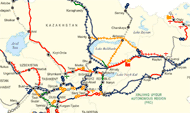
 |
|
|
|
PROJECTS > Bishkek-Osh, Phase IV Bishkek-Osh, Phase IVCAREC Corridor 3 (Bishkek-Osh Road) Improvement Project, Phase 4. Technical Assistance. The Bishkek-Osh road represents about one third of the core international road corridor network in the Kyrgyz Republic, and links the country to Kazakhstan in the north, Uzbekistan and Tajikistan in the south, and the People's Republic of China in the southeast. It crosses four of the seven provinces of the country and serves about 2 million people. It is the only direct surface link between the southern and northern parts of the country making it crucial for maintaining the country's social, political, and economic integrity. The Bishkek-Osh road forms part of the Central Asia Regional Economic Cooperation (CAREC) Corridor 3,2 which runs from the west and south Siberian region of the Russian Federation through Kazakhstan, Kyrgyz Republic, Tajikistan, Afghanistan, and Uzbekistan to the Middle East and South Asia. The Asian Development Bank (ADB) has assisted the Kyrgyz Republic in rehabilitating 483 km of the 655 km Bishkek-Osh road through three loans in a total amount of $140 million. Other development partners, such as the Japan International Cooperation Agency and Islamic Development Bank cofinanced the rehabilitation of this road. Combined, the development partners have assisted the government in rehabilitating over 539 km (82%) of the Bishkek-Osh road. However, due to funding limitations, there remain two missing sections of the Bishkek-Osh road needing rehabilitation: Bishkek to Kara Balta (60 km) and Madaniyak to Jalalabad (70 km). The state of these roads warrants urgent attention. Road improvement in the adjacent sections attracts increased traffic, but the two sections will not be able to provide the needed level of service and will also pose traffic hazards. Therefore, the government has requested ADB to help rehabilitate the two road sections under the project. No project preparatory work has been carried out for the project. A project preparatory Technical Assistance (TA) in the amount of $1 million equivalent is implementing from September 2012 and will completed at August 2013. The TA is financed on a grant basis from the ADB Technical Assistance Special Fund and be carried out by an international consulting firm, «Kocks Consult GmbH», which was recruited and engaged in accordance with ADB's Guidelines on the Use of Consultants using quality- and cost- based selection method. The diligence to be carried out under the project preparatory TA includes the following: (i) Technical. Preliminary assessment for the road rehabilitation works will be carried out based on site condition surveys and field investigations. Viable engineering options will be prepared and optimized for economy and construction efficiency in accordance with best international practice and applicable standards, and wherever possible, will use proven technology with standard materials compatible with local conditions. Road safety program will be taken into consideration in the road designs. Methodologies in developing a robust road maintenance regime will be explored. (ii) Economic. Being a rehabilitation project on a strategic and high traffic national and regional road, the economic returns are expected to be high. The TA will access the economic benefits of each road section by comparing the with- and without-project scenarios. (iii) Governance. An assessment of the sector and Executive Agency on financial management, procurement, anticorruption, policy and legal, capacity, and other institutional aspects will be carried out under the TA. If inadequacies are identified, appropriate mitigation measures will be developed for inclusion in the project design. (iv) Poverty and social. A poverty and social analysis (PSA) will be prepared, which assesses project impact channels for poor population groups, especially in rural area. A rapid gender analysis will be carried out to inform project design. The PSA will include assessing possible risks such as HIV/AIDS, human trafficking, labor impact and will identify mitigation measures, if needed; consultation and information sharing with civil society and will be conducted in compliance with ADB's Handbook on Social Analysis (2007). (v) Safeguards. As a road rehabilitation project, safeguard impacts are expected to be minimal. The project is categorized B for both involuntary resettlement and environment, and C for indigenous peoples. The TA will prepare an initial environmental examination (IEE) including an environmental management plan and undertake resettlement planning as required, all in compliance with ADB's Safeguard Policy Statement (SPS) (2009). |
Transport corridors 
Gallery 
|
|
Группа реализации инвестиционных проектов |